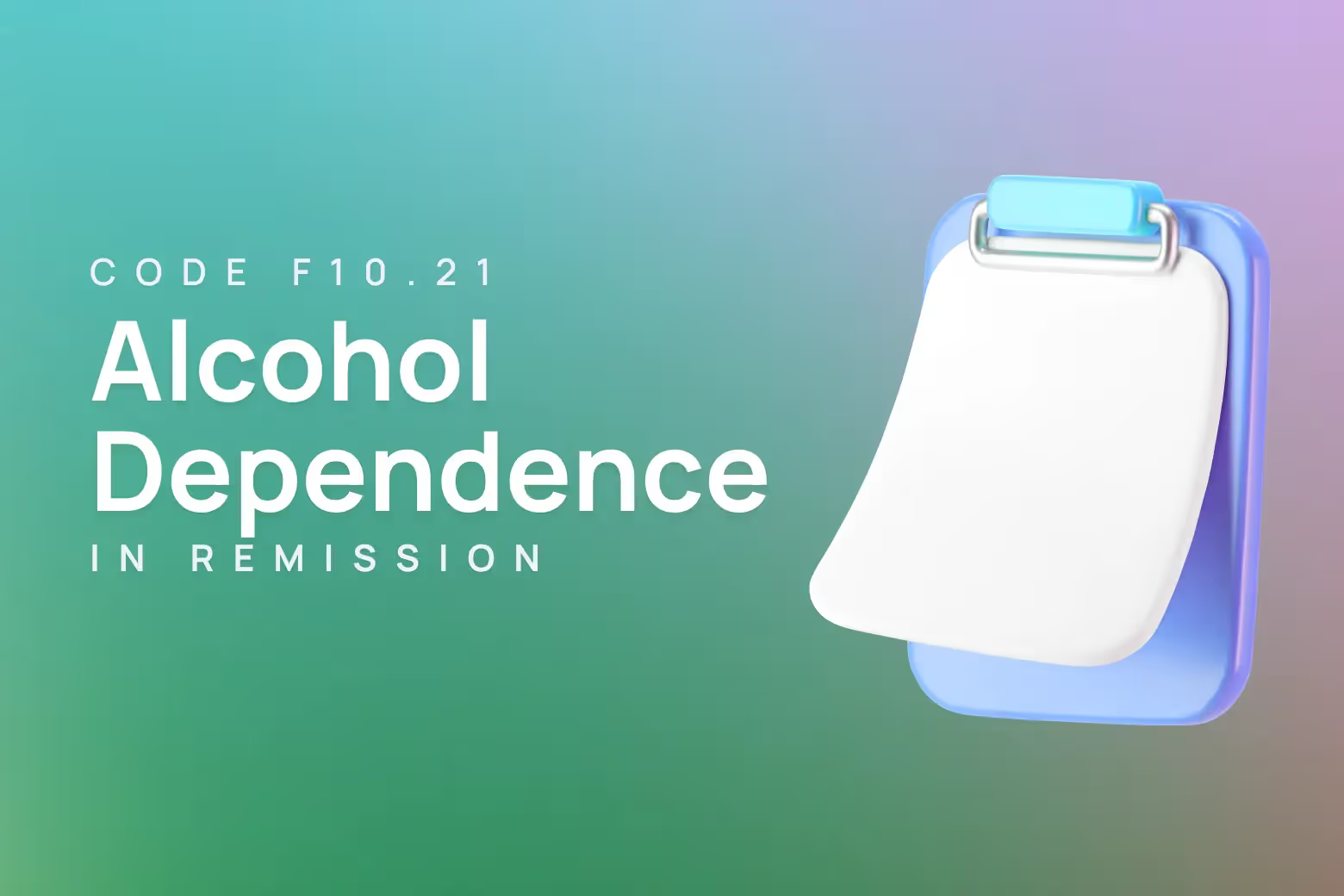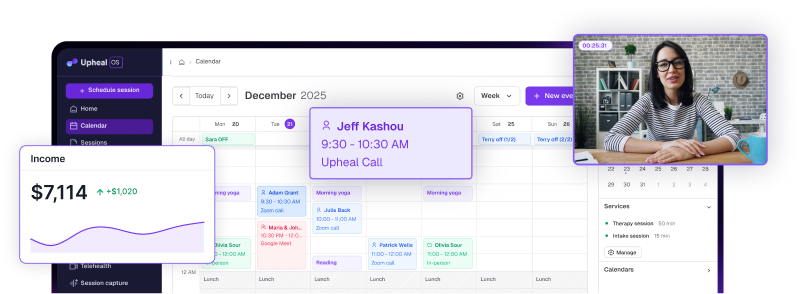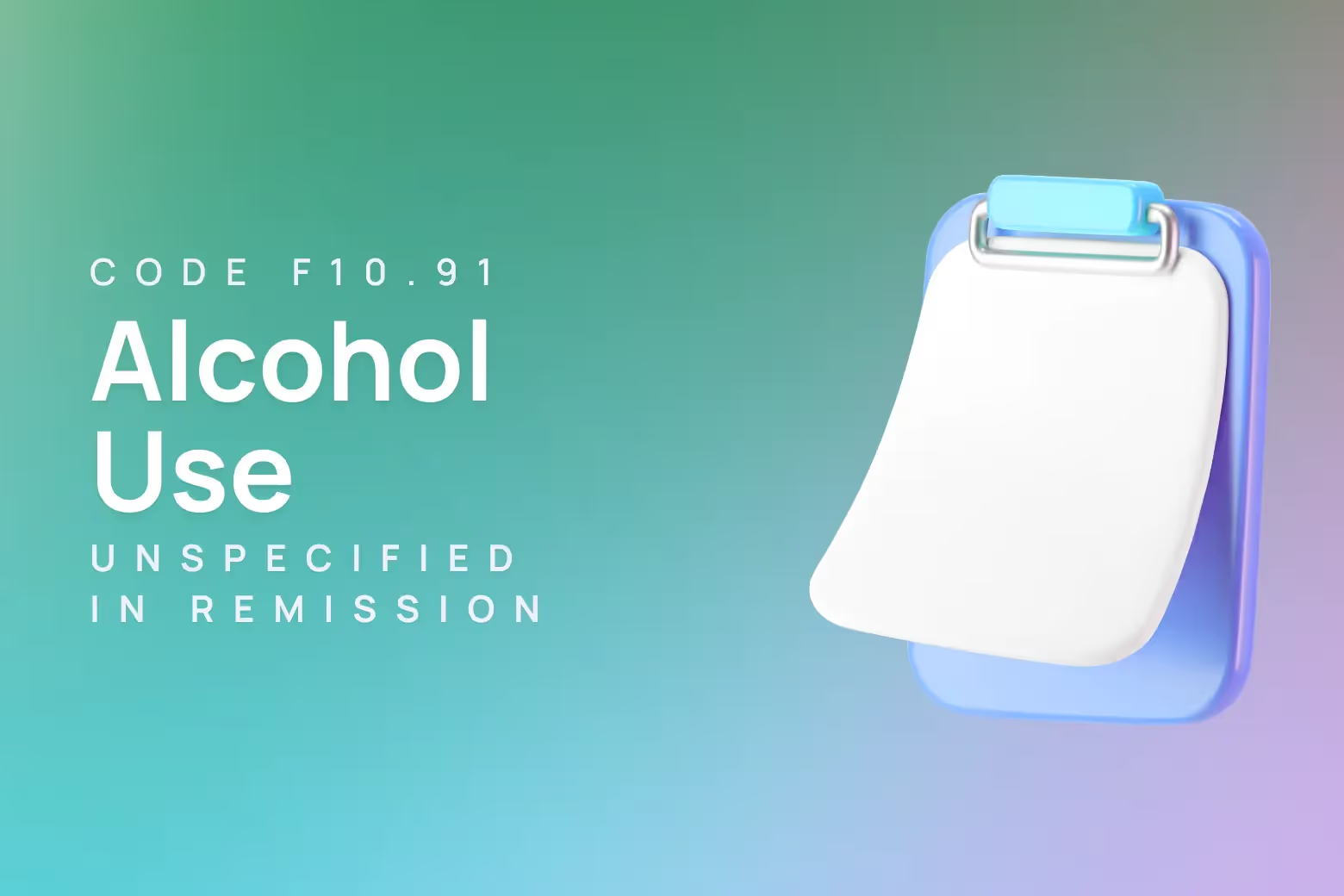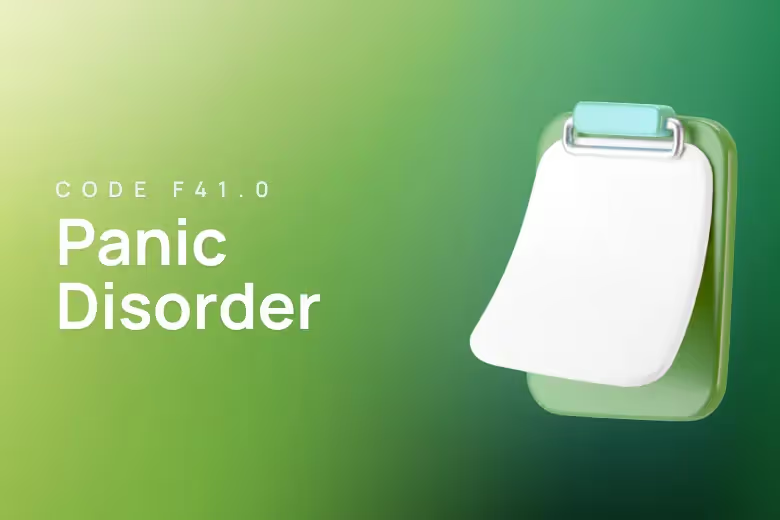ICD-10 code for alcohol dependence, in remission

F10.21 is the ICD-10 code for alcohol dependence, in remission.
This code identifies individuals who previously met criteria for alcohol dependence but are currently abstaining from problematic alcohol use while maintaining recovery.
Accurate documentation of remission status helps clinicians track treatment progress and supports ongoing care planning.
Key features:
- Indicates active recovery from alcohol dependence with sustained abstinence or controlled use
- Requires prior diagnosis of alcohol dependence (F10.20) before remission coding
- Documentation must specify remission duration and recovery stability
- Supports treatment planning that emphasizes relapse prevention and sustained recovery

Diagnostic criteria for alcohol dependence, in remission (F10.21)
The remission specifier applies when a client previously met full criteria for alcohol use disorder but no longer exhibits problematic patterns.
Early remission begins after at least three months but less than twelve months without meeting disorder criteria, except craving may persist. Full remission extends beyond twelve months of symptom-free recovery.
Clinicians should document the timeline of abstinence or controlled use, noting any ongoing recovery support activities.
Recovery maintenance often involves continued therapy, mutual support participation, lifestyle changes, and addressing co-occurring mental health conditions. The distinction between early and full remission helps communicate treatment progress to other providers and insurance companies.
Criteria for remission coding include:
- Previous alcohol dependence diagnosis documented in clinical record
- Absence of dependence criteria for specified duration (minimum 3 months)
- No current impairment in social, occupational, or personal functioning due to alcohol
- Client demonstrates active recovery behaviors and relapse prevention strategies
- Craving may be present without disqualifying remission status
- Medical complications from prior use may persist but drinking has ceased
When to use F10.21 diagnosis code
Distinguishing remission status from other alcohol-related diagnoses ensures proper documentation of client progress. The remission code communicates ongoing recovery work rather than active dependence, affecting treatment planning and insurance authorization.
F10.21 vs F10.20 (Alcohol dependence, uncomplicated)
Code F10.20 describes active alcohol dependence without current intoxication or withdrawal. Clients continue experiencing impaired control, social problems, risky use, and tolerance or withdrawal symptoms. This code applies when dependence criteria remain present.
In contrast, F10.21 documents prior dependence with current remission. The client has achieved stability and no longer meets dependence criteria. Treatment shifts from addressing active use to maintaining recovery gains and preventing relapse.
F10.21 vs F10.10 (Alcohol abuse, uncomplicated)
Alcohol abuse involves problematic use causing recurrent social, legal, or interpersonal consequences without the physiological dependence features of tolerance and withdrawal. Clients with F10.10 continue active problematic drinking patterns.
Remission from dependence (F10.21) indicates a more severe prior condition now successfully managed. The client previously experienced dependence symptoms but has achieved sustained recovery, requiring different clinical considerations than someone with ongoing abuse patterns.
F10.21 vs F10.11 (Alcohol abuse, in remission)
Both codes indicate remission status, but F10.11 documents recovery from alcohol abuse rather than dependence. Abuse represents less severe pathology without the compulsive use and withdrawal features characteristic of dependence.
Clinicians should review the client's history to determine whether prior diagnosis involved abuse-level or dependence-level criteria. This distinction affects relapse risk assessment and treatment intensity recommendations during maintenance phases.
Related ICD-10 codes
- F10.20 - Alcohol dependence, uncomplicated
- F10.10 - Alcohol abuse, uncomplicated
- F10.11 - Alcohol abuse, in remission
- F10.120 - Alcohol abuse with intoxication, uncomplicated
- F10.220 - Alcohol dependence with intoxication, uncomplicated
- F10.230 - Alcohol dependence with withdrawal, uncomplicated
- F10.231 - Alcohol dependence with withdrawal delirium
- F10.14 - Alcohol abuse with alcohol-induced mood disorder
- F10.24 - Alcohol dependence with alcohol-induced mood disorder
Interventions and CPT codes for alcohol dependence in remission
Individual psychotherapy for relapse prevention
Ongoing individual therapy focuses on maintaining sobriety through cognitive-behavioral approaches, motivational enhancement, and relapse prevention planning. Sessions address triggers, coping skills, lifestyle balance, and co-occurring mental health concerns that could threaten recovery stability.
Clinicians should document session content, specific interventions used, and client progress toward recovery goals. Time spent in therapeutic contact determines appropriate code selection.
Relevant CPT codes:
- 90832 - Psychotherapy, 30 minutes (16-37 minutes)
- 90834 - Psychotherapy, 45 minutes (38-52 minutes)
- 90837 - Psychotherapy, 60 minutes (53+ minutes)
Family therapy for recovery support
Family involvement strengthens recovery by addressing relationship dynamics, communication patterns, and codependency issues. Sessions help family members understand addiction as a chronic condition, establish healthy boundaries, and create supportive home environments that reduce relapse risk.
Relevant CPT codes:
- 90846 - Family psychotherapy without patient present
- 90847 - Family psychotherapy with patient present
Group therapy for sustained recovery
Group psychotherapy provides peer support, shared experiences, and skill-building in a structured therapeutic environment. Groups focused on relapse prevention help clients develop recovery networks, practice interpersonal skills, and normalize the challenges of maintaining long-term sobriety.
Relevant CPT code:
- 90853 - Group psychotherapy
Crisis intervention for relapse risk
When clients experience acute stressors threatening recovery stability, crisis intervention helps manage immediate risks and reinforce coping strategies. Sessions address situational triggers, emotional dysregulation, or environmental pressures that increase relapse vulnerability.
Relevant CPT codes:
- 90839 - Psychotherapy for crisis, first 60 minutes
- 90840 - Psychotherapy for crisis, each additional 30 minutes (add-on code)
Comprehensive diagnostic evaluation
Initial or periodic comprehensive evaluations document remission status, assess ongoing recovery needs, and update treatment plans. These evaluations establish baseline functioning and identify emerging concerns requiring clinical attention.
Relevant CPT code:
- 90791 - Psychiatric diagnostic evaluation
How Upheal improves F10.21 ICD-10 documentation
Suggesting appropriate ICD-10 codes based on session content
Upheal's clinical documentation platform analyzes session content to recommend accurate diagnostic codes, including remission specifiers that reflect current clinical status. The platform identifies key indicators of sustained recovery mentioned during sessions, helping clinicians document progress appropriately.
When clients discuss recovery milestones, ongoing abstinence, or relapse prevention strategies, Upheal flags these as supporting evidence for remission coding. This reduces the risk of inadvertently using active dependence codes when remission status better represents current functioning.
Maintaining HIPAA-compliant records with proper diagnostic coding
Accurate remission documentation creates a clear clinical narrative showing treatment effectiveness over time. Upheal stores all diagnostic information securely while ensuring compliance with federal privacy regulations.
The platform tracks diagnostic code changes throughout treatment, creating an audit trail that demonstrates clinical reasoning behind coding decisions. This documentation supports insurance claims and provides continuity when transferring care between providers.
Reducing administrative burden so you can focus on client care
Manual documentation of remission criteria, treatment progress, and session content consumes valuable clinical time. Upheal automates progress note generation, pulling relevant details from session recordings to create comprehensive documentation that supports diagnostic coding.
Clinicians spend less time writing notes and more time on therapeutic interventions that sustain client recovery. The platform handles administrative requirements while preserving the clinical nuances that distinguish remission from active use disorders.
Supporting clients with alcohol dependence in remission
Recovery from alcohol dependence represents significant achievement requiring ongoing clinical support. Clients in remission benefit from therapy that addresses underlying vulnerabilities, builds resilience against future stressors, and reinforces recovery-supporting behaviors and relationships.
Treatment during remission phases differs substantially from interventions for active dependence. Rather than focusing on cessation or withdrawal management, therapy emphasizes quality of life improvements, personal growth, and development of a meaningful identity beyond addiction recovery.
Clinicians should remain vigilant for early warning signs of relapse while celebrating recovery progress. Regular assessment of mood, stress levels, social support, and coping effectiveness helps identify emerging risks before they threaten sobriety. Collaborative treatment planning keeps clients engaged in their recovery journey.
Upheal helps clinicians maintain comprehensive documentation throughout the recovery process, from initial dependence through sustained remission. The platform's automated progress notes capture clinical nuances that support accurate coding while reducing documentation time.
Try Upheal free to see how it can improve your clinical documentation and allow more time for the therapeutic work that supports lasting recovery.












